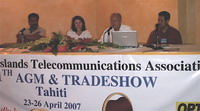Internet Corporation launches new project of Assigned Names and Numbers
An Internet Corporation created a working group to accelerate the process of assigning addresses entirely in other languages.

The decision by the Internet Corporation for Assigned Names and Numbers represents another step toward the approval of internationalized domain names, or IDNs, as early as next year.
The working group will focus on domains for specific countries, such as the Chinese-character equivalent of China's ".cn" suffix.
"The introduction of the IDNs is absolutely one of the most important changes to the domain name space since its inception," ICANN Chairman Vint Cerf said. "It's taken many years to get to the point where there is confidence that we understand how to do this."
ICANN started technical tests on such suffixes last month, but work on policy questions is still preliminary.
The organization needs to grapple with how to assign such names and resolve any conflicts or complaints. For example, should the operators of China's ".cn" automatically be entitled to the Chinese version of that and ".com"? What happens when a competing organization, such as Taiwan's ".tw" or a private company, wants to claim it?
Those questions could take years to resolve so ICANN is looking at interim procedures that would apply to country-specific domains. The working group was tasked with figuring out how to develop that process. It is to provide a status report in time for ICANN's February meetings in New Delhi.
Currently ICANN assigns country-specific domains in English based on lists of recognized countries and territories kept by the International Organization for Standardization. ICANN wants to identify a comparable list or other procedures for other languages to avoid having to rule on what is a country and how to pen its name.
Later, ICANN will have to figure out how to permit more generic monikers, such as ".com" in Chinese or Arabic. Those broader policy questions are not part of the working group's mandate.
Individuals and companies outside the United States long have clamored for non-English scripts, finding restrictive the current limitation of domain names to 37 characters: a-z, 0-9 and the hyphen.
Addresses partly in foreign languages are sometimes possible, but the suffix - the ".com" part of an address - for now requires non-English speakers to type English characters.
As ICANN concluded weeklong meetings in Los Angeles, Cerf said the creation of non-English domains does not necessarily mean more Web sites in other languages.
"It may help content to be discovered but it does not cause it to be created," Cerf said. "So to the extent that we want more content on the network in languages that are native to many populations around the world, we have to encourage people to produce that content. ... This is a completely separate activity, but one without which the Internet and the World Wide Web are far less valuable."
During the meeting, ICANN officials also promised to review the status of domain names applications that were submitted in 2000 but not approved. ICANN never formally rejected them and plans to clarify their status before the next round of applications are solicited, likely next year.
ICANN approved seven out of 47 applications in 2000: ".info" for general information, ".biz" for businesses, ".name" for individuals, ".pro" for professionals, ".museum" for museums, ".coop" for business cooperatives and ".aero" for the aviation industry.
Subscribe to Pravda.Ru Telegram channel, Facebook, RSS!


